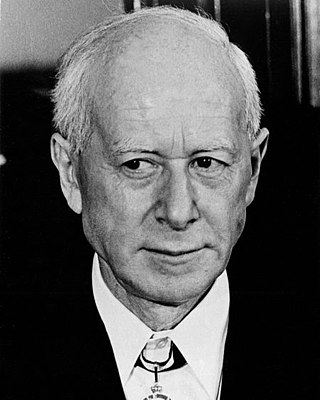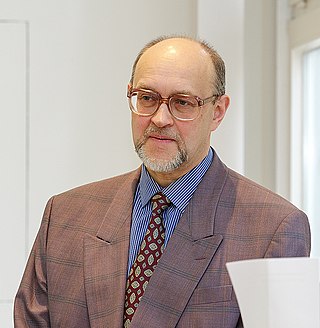
Galicia is a historical and geographic region spanning what is now southeastern Poland and western Ukraine, long part of the Polish–Lithuanian Commonwealth. It covers much of the other historic regions of Red Ruthenia and Lesser Poland.

The Kingdom of Galicia and Lodomeria, also known as Austrian Galicia or colloquially Austrian Poland, was a constituent possession of the Habsburg monarchy in the historical region of Galicia in Eastern Europe. The crownland was established in 1772. The lands were annexed from the Polish-Lithuanian Commonwealth as part of the First Partition of Poland. In 1804 it became a crownland of the newly proclaimed Austrian Empire. From 1867 it was a crownland within the Cisleithanian or Austrian half of the dual monarchy of Austria-Hungary. It maintained a degree of provincial autonomy. Its status remained unchanged until the dissolution of the monarchy in 1918.

Mykhailo Serhiiovych Hrushevsky was a Ukrainian academician, politician, historian and statesman who was one of the most important figures of the Ukrainian national revival of the early 20th century. Hrushevsky is often considered the country's greatest modern historian, the foremost organiser of scholarship, the leader of the pre-revolution Ukrainian national movement, the head of the Central Rada, and a leading cultural figure in the Ukrainian SSR during the 1920s.

Aleksander Brückner was a Polish scholar of Slavic languages and literature (Slavistics), philologist, lexicographer, and historian of literature. He is among the most notable Slavicists of the late 19th and early 20th centuries, and the first to prepare complete monographs on the history of the Polish language and culture. He published more than 1,500 titles and discovered the oldest extant prose text in Polish.

İlber Ortaylı is a Turkish historian and professor of history of Crimean Tatar origin at the MEF University, Galatasaray University in Istanbul and at Bilkent University in Ankara. In 2005, he was appointed as the director of the Topkapı Museum in Istanbul, until he retired in 2012.

George Alexandrovich Ostrogorsky was a Russian-born Yugoslavian historian and Byzantinist who was widely known for his achievements in Byzantine studies. He was a professor at the University of Belgrade.

Bilateral relations exist and existed between Austria and Russia and their predecessor states. Since October 1955, the Republic of Austria maintains the constitutionally-mandated status of neutrality; the country is a founding member of the Organisation for Economic Co-operation and Development (OEEC). Austria joined the EU in 1995. Russia is a permanent member of the United Nations Security Council, a partner of ASEAN, a member of the Shanghai Cooperation Organisation (SCO), the G20, the Asia-Pacific Economic Cooperation (APEC), the Organization for Security and Co-operation in Europe (OSCE), as well as the leading member state of the Commonwealth of Independent States (CIS), the Collective Security Treaty Organization (CSTO), and the Eurasian Economic Union (EEU). Both countries are members of the Organization for Security and Co-operation in Europe and the World Trade Organization (WTO).

Rudolf Simek is an Austrian philologist and religious studies scholar who is Professor and Chair of Ancient German and Nordic Studies at the University of Bonn. Simek specializes in Germanic studies, and is the author of several notable works on Germanic religion and mythology, Germanic peoples, Vikings, Old Norse literature, and the culture of Medieval Europe.
Pieter M. Judson is an American professor of history.
Christian Habicht was a German historian of ancient Greece and an epigrapher in Ancient Greek.

Oliver Jens Schmitt is a professor of South-East European history at Vienna University since 2005. He is a member of the Austrian Academy of Sciences.

John-Paul Himka is an American-Canadian historian and retired professor of history of the University of Alberta in Edmonton. Himka received his BA in Byzantine-Slavonic Studies and Ph.D. in History from the University of Michigan in 1971 and 1977 respectively. The title of his Ph.D. dissertation was Polish and Ukrainian Socialism: Austria, 1867–1890. As a historian Himka was a Marxist in the 1970s–80s, but became influenced by postmodernism in the 1990s. In 2012 he defined his methodology in history as "eclectic".
Ukrainians and Russians have a long history of interactions and mutual influences, which is often used to explain and also to justify the Russo-Ukrainian War.

Volodymyr Potulnytskyi is a Ukrainian historian who specializes in European medieval history, Ukrainian political science, intellectual history, historiosophy and historiography of Eastern Europe.

Karin Kneissl is an Austrian diplomat, journalist, and politician. She served as Minister of Foreign Affairs between 2017 and 2019. Prior to assuming her government position, she was a lecturer.

Karl Nehammer is an Austrian politician who is the 32nd and current chancellor of Austria since 6 December 2021. A member of the Austrian People's Party (ÖVP), he previously was Minister of the Interior from 2020 to 2021, general secretary of the ÖVP from 2018 to 2020, as well as a member of the National Council from 2017 to 2020. Nehammer assumed the chancellorship as the successor of Alexander Schallenberg, who resigned to return as Minister of Foreign Affairs.

Michael Gehler is an Austrian historian. He has been teaching at the German University of Hildesheim since 2006.
Kerstin Susanne Jobst is a German historian and professor. Since 2012 she has taught at the Institute for East European History at the University of Vienna.
Hans Hirsch was an Austrian academic who worked between 1903 and 1914 on the vast "Monumenta Germaniae Historica" sources project, and subsequently became a full-time professional historian. He accepted an ordinary (full) professorship in history at the German University in Prague as the war ended, transferring in 1926 to the University of Vienna. The focus of his research and teaching was on medieval history. In parallel he built for himself a reputation as a specialist on the "Sudeten Germans", which marked him out as a more than averagely politicised historian. His application for party membership was still outstanding at the time of his death, however.

Martin Schulze Wessel is a German historian. He has been Professor of Eastern European History at the Ludwig Maximilian University of Munich since 2003.














